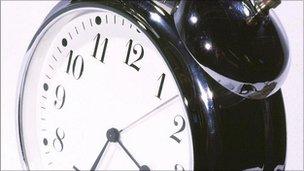Peers bed down for the late, late debate
- Published

Peers can expect to awoken at all hours to vote
There is free tea and biscuits all night in the Long Room. Soup and chocolate from the Bishops' Sandwich Bar. And five rooms set aside so peers may rest their heads between votes, snoozing in dormitories divided by sex and party.
Sadly, but perhaps advisedly, the Lords Bar closes at 1030.
Thus has begun the first trial of strength of the coalition era between the government and Labour in the House of Lords.
Peers are debating the government's plans to hold a referendum on electoral reform. The rules need to become law by the middle of February. If they do not, then existing electoral law says there will not be enough time for officials to prepare for the referendum which is scheduled for 5 May.
The government does not want the referendum to be delayed. The Leader of the Lords, Lord Strathclyde, accused Labour peers of going slowly deliberately, dragging their heels so that the Parliamentary Voting System and Constituencies Bill will not pass in time.
Stamina test
Labour, though, denies it is filibustering, despite one of its peers debating at one point the history of the Venerable Bede at some length. The party says it simply wants to give a substantial and important constitutional change proper scrutiny.
The former Lord Chancellor, Lord Falconer, said the government could get its referendum in time - but only if controversial plans for boundary changes and fewer MPs were taken out of the same bill.
That means some long nights this week until one side blinks.
For many peers it will be a question of stamina. For the parties, it will be a question of numbers. At the very least, the government needs at least 30 peers on hand to ensure that the House of Lords is quorate for a vote.
There are several undercurrents in this row:
1. The government feels it simply cannot delay the referendum on the alternative vote. This is because the deal to press ahead with a referendum at the same time as cutting the number of MPs was a key part of the coalition agreement. It was part of the political balance between the needs of the Conservatives and Liberal Democrats.
To unstitch either would give the coalition a huge headache and that is why ministers from both parties insist that there will be no compromise.
2. The government is learning that its plans for boundary changes are not as uncontroversial as perhaps it originally thought. Labour peers are not the only ones with concerns. There are MPs from all sides who worry that the consequences of these changes have not been entirely thought through.
3. Labour peers are waking up to the fact that they face what is effectively a government majority in the House of Lords and they do not like it. The coalition brings together Conservative and Liberal Democrat peers and they are hard to beat, unless Labour and the crossbenchers are utterly united on an issue.
So this row over AV is seen by some in the Lords as an attempt by Labour peers to flex their muscles and make clear to the government that they will not be a push-over.
4. This is a taste of things to come. Peers are interested in the electoral rules for the House of Commons but only up to a point, Lord Copper. They are, of course, much more interested in the rules for their own house and Lords reforms are coming down the line shortly.
Nick Clegg is drawing up a paper with his latest plans for a largely elected second chamber which many peers oppose. The government will almost certainly face all-night sittings on that and ministers will find it much harder to get the support of their own benches.
- Published18 January 2011
- Published18 January 2011
- Published13 January 2011
- Published18 April 2011
- Published27 November 2010
- Published23 November 2010
- Published15 November 2010
- Published2 November 2010